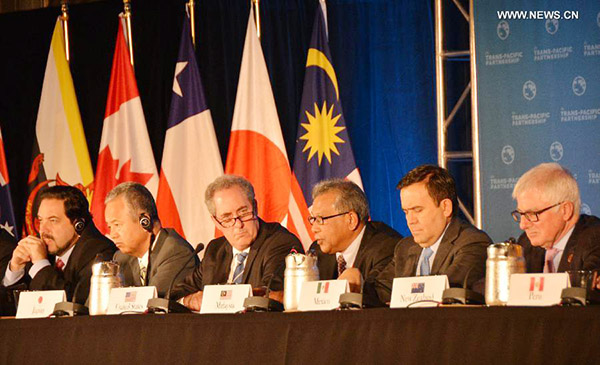 |
|
Trade ministers of the United States and 11 other Pacific Rim countries attend a press conference after negotiating the Trans-Pacific Partnership (TPP) trade agreement in Atlanta, the United States, on Oct. 5, 2015. [Photo/Xinhua] |
US President-elect Donald Trump, his opponent in the election Democratic presidential nominee Hillary Clinton and many Chinese have at least one thing in common. None of them is fond of the Trans-Pacific Partnership Agreement; although for very different reasons.
Clinton, when as US secretary of state, called the deal agreed among 12 Asia-Pacific countries the "gold standard" for trade agreements, but she opposed it while campaigning in order to win more union voters.
Trump has been more consistent. He has repeatedly called the TPP "a potential disaster for our country", and he announced on Monday the first thing his administration will do is to withdraw from the agreement.
For many Chinese, the death knell sounded by Trump is welcome news because they don't have to listen to President Barack Obama banging the drum for the US, "not countries like China", writing the trade rules.
Such words sound not only humiliating to many Chinese, but also ridiculous and highly hypocritical.
Why on earth would anyone think China, with one-fifth of the world's population, should not participate in writing global trade rules, or any global rules? For Obama to think like that is akin to wishing that all the states that were won by the Republicans should not have been allowed to vote in the presidential election.
Excluding China from the discussions on drawing up the global rules and norms reveals an anti-democratic mindset, not to mention that China, rather than the US, is now the world's largest trading nation.
The fact that Obama has constantly used the TPP in its rebalancing to Asia strategy has altered the meaning of a free trade agreement as he has made the free trade agreement a US foreign policy tool.
The TPP's economic benefits are controversial to say the least. Some US economists who studied the documents carefully concluded that the economic benefits to the US are quite limited, in contrast to the praise heaped on it by US officials in lobbying Congress and the American public.
Some multinational corporations may be the winners with the TPP, but many US workers and communities vulnerable to free trade agreements are likely to suffer. Over the years, the US government has done a poor job in helping them.
The opposition to the TPP among Americans is so strong that at a rally on Nov 17 by Senator Bernie Sanders and his supporters near Capitol Hill, many held anti-TPP plaques and claimed that it was Sanders' movement that has brought an end to TPP.
There is no reason for China and the US not to pursue a win-win game that will benefit both peoples. At the 27th China-US Joint Commission on Commerce and Trade held in Washington this week, Vice-Premier Wang Yang, US Commerce Secretary Penny Pritzker, US Trade Representative Michael Forman and US Agriculture Secretary Tom Vilsack and other officials all spoke of the rapid growth in bilateral trade and investment relations and more importantly, the huge potential ahead.
People close to Trump, such as former CIA director James Woolsey Jr, have indicated that the Trump administration might join the Asian Infrastructure Investment Bank and even the Belt and Road Initiative (the Silk Road Economic Belt and 21st Century Maritime Silk Road).
While nothing is sure. This is an encouraging signal, as it suggests that the Trump administration may be more willing to pursue win-win cooperation with China.
The author is deputy editor of China Daily USA. [email protected]